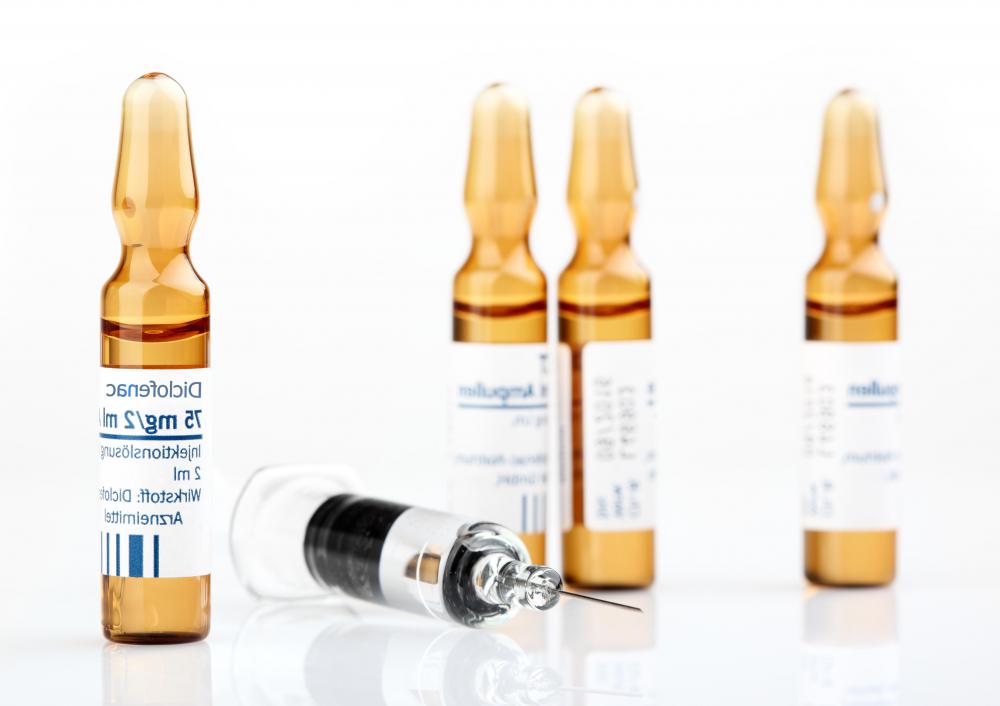At WiseGEEK, we're committed to delivering accurate, trustworthy information. Our expert-authored content is rigorously fact-checked and sourced from credible authorities. Discover how we uphold the highest standards in providing you with reliable knowledge.
What Factors Affect Voltaren® Dosage?
Like other members of the non-steroidal anti-inflammatory drug (NSAID) class of medication, Voltaren® is generally used orally to treat inflammation, pain, and fever in part through its selective inhibition of type one and type two cyclooxygenases. Negative reactions to this drug may increase in frequency and severity as the length of treatment and the dosage level increase, making it advisable to use the lowest possible dosage level for the shortest period of time for the effective treatment of symptoms. A number of factors may affect the appropriate Voltaren® dosage, such as the patient's age, liver health, kidney function, current drug regimen, and condition to be treated.
When using Voltaren® to treat the pain, stiffness and inflammation of severe osteoarthritis, the recommended initial Voltaren® dosage in adults is 100 to 150 mg per day in two to three divided doses. A higher initial daily Voltaren® dosage of 150 to 200 mg is recommended in the treatment of rheumatoid arthritis, also in divided doses, to minimize the risk of gastrointestinal side effects. For patients receiving this medication for the treatment of ankylosing spondylitis, an initial Voltaren® dosage of 100 to 125 mg should be given in four divided doses each day, with an additional 25 mg maintenance dose permitted before bedtime if needed. The initial Voltaren® dosage or dose frequency may be increased after the first week of therapy if the initial dose is not sufficient for the control of symptoms.

Although it is possible that pediatric, geriatric or debilitated patients may require lower levels of this medication, as of 2011 no conclusive research has been done on dosage adjustments in these populations. While patients with decreased liver function may well benefit from lower initial doses, there are currently no dosage recommendations for Voltaren® in patients with hepatic insufficiency. Patients with decreased kidney function are unlikely to require lower doses due to lowered clearance of the medication from the bloodstream, but should receive the lowest possible dose to mitigate the risk of further damage to the kidneys.

Drug interactions with Voltaren® pose a significant risk, making a careful evaluation of existing and new treatments necessary with all patients using the drug. Patients receiving treatment with anticoagulant drugs should receive regular hematological tests to determine the effects of all Voltaren® dosage adjustments on platelet aggregation. Warfarin, methotrexate, angiotensin-converting enzyme (ACE) inhibitors, furosemide, cyclosporine, lithium and drugs affecting the levels of liver enzymes cytochrome P450 2C9 should never be combined with Voltaren®. Patients with severe asthma or who have experienced asthmatic reactions to aspirin-type medications should also avoid undergoing treatment with Voltaren®, as this may indicate an increased risk for serious bronchospasmic events.
Voltaren® is the brand name form of the medication diclofenac, a (NSAID) drug known as 2-(2,6-dichloranilino) phenylacetic acid. Patients should carefully consider the utility of treatment with NSAIDs versus alternative drugs, as these medications pose significant health risks. These side effects include heart attack, stroke, cardiovascular thrombosis, catastrophic internal bleeding, high blood pressure, congestive heart failure, gastrointestinal perforation, severe kidney damage, severe liver damage, fatal skin conditions, and anaphylaxis.
AS FEATURED ON:
AS FEATURED ON:












Discuss this Article
Post your comments